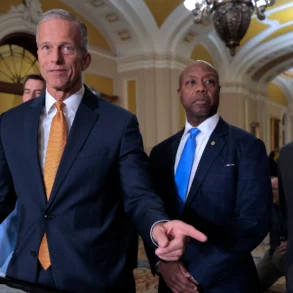As the Senate races toward a critical vote this weekend, President Donald Trump’s ambitious domestic agenda hangs in the balance. The 940-page bill, packed with tax cuts, spending increases, and controversial changes to programs like Medicaid, has sparked division among Senate Republicans. With a tight deadline to get the bill to Trump’s desk by July 4, 2025, Senate Majority Leader John Thune is struggling to unify his party. Here’s a look at the high-stakes battle unfolding in Washington.
A Fragile Coalition
The Senate’s version of Trump’s “One Big Beautiful Bill” aims to extend the 2017 tax cuts, boost border security, and overhaul programs like Medicaid and SNAP (Supplemental Nutrition Assistance Program). However, the bill’s massive $5 trillion debt ceiling increase and deep cuts to social safety nets have drawn sharp criticism from both fiscal conservatives and moderates within the GOP.
Sen. Thom Tillis of North Carolina, facing reelection in 2026, has emerged as a key opponent, vowing to vote against the bill unless significant changes are made to protect Medicaid funding. Tillis’s stance is a major blow, as GOP leaders can only afford to lose three Republican votes to pass the bill. Other holdouts, including Sens. Lisa Murkowski, Jerry Moran, and Susan Collins, have also expressed concerns about Medicaid cuts, particularly their potential to harm rural hospitals. Meanwhile, fiscal hawks like Sens. Rand Paul, Ron Johnson, and Mike Lee are pushing back against the bill’s deficit-busting price tag.
Despite these divisions, some Republicans, like Sen. Josh Hawley, have signaled support after negotiations addressed their concerns. Sen. Collins, a key centrist, plans to back the initial procedural vote but warned she might oppose the final bill without further changes. “I will be filing a number of amendments,” Collins said, signaling the fight is far from over.
What’s in the Bill?
The Senate’s updated bill includes several major provisions:
Tax Cuts and Deductions: The bill extends Trump’s 2017 tax cuts, adding $4 trillion in tax reductions. It also raises the state and local tax (SALT) deduction cap to $40,000 for married couples until 2028, a win for Republicans from high-tax states like New York. Additionally, it introduces deductions for tip wages ($25,000) and overtime pay ($12,500) through 2028, while increasing the child tax credit to $2,200 per child.
Debt Ceiling Increase: The Senate proposes a $5 trillion debt limit hike, up from the House’s $4 trillion, to avoid a catastrophic default. This has sparked fierce opposition from fiscal conservatives like Sen. Paul, who called the increase unacceptable.
Medicaid and SNAP Reforms: The bill imposes work requirements for Medicaid and SNAP beneficiaries, requiring able-bodied adults to work 80 hours per month. It also phases out a provider tax that funds Medicaid, raising fears of hospital closures, though a $25 billion fund aims to support rural hospitals starting in 2028.
Border Security: The bill allocates $46.5 billion for Trump’s border wall, $10 billion for general border security, and $4.1 billion to hire border agents, alongside new immigration fees.
Other Provisions: The bill scraps Biden-era student loan repayment plans, caps federal loans for parents and graduate students, and allocates $500 million for broadband access, with a catch: states must avoid regulating artificial intelligence for a decade to qualify.
The Senate’s Tightrope
The Senate faces a grueling process to pass the bill. If it clears Saturday’s procedural vote, it will enter a “vote-a-rama,” an all-night session where senators propose and vote on amendments. Democrats plan to target weaknesses, particularly Medicaid cuts, to pressure GOP holdouts. The Senate parliamentarian, Elizabeth MacDonough, has already forced changes by ruling out provisions like a $1,000 asylum application fee and parts of a government spectrum auction, complicating the GOP’s efforts to comply with budget rules.
If the bill passes the Senate, it faces another hurdle in the House, where Speaker Mike Johnson must rally a razor-thin Republican majority. The House narrowly passed its version in May, and further changes could alienate key supporters, especially those focused on the SALT deduction.
Why It Matters
The bill’s fate will shape Trump’s presidency and the GOP’s agenda. A failure to pass it would be a major setback, potentially unraveling the fragile coalition Thune has worked to build. Delays could embolden critics to demand more changes, risking further division. Yet, even those skeptical of the bill, like Sen. Bernie Moreno of Ohio, argue that the GOP has debated it enough: “We discussed this thing ad nauseam.”
As the Senate barrels toward its weekend vote, the nation watches to see if Trump’s vision will become law—or if internal GOP strife will derail it. With the clock ticking, the outcome remains uncertain, but the stakes couldn’t be higher.








